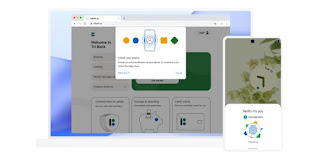With passkeys, Google wants to erase all of your passwords on Chrome and Android
 |
| With passkeys, Google wants to erase all of your passwords on Chrome and Android |
Although you won't be able to use passkey support without some fiddling just yet, Google is integrating it into Android. The search engine giant announced that users of Chrome Canary or Google Play Services Beta would be able to test the password-killing feature starting today, with wide availability following later in the year. Passkeys also became accessible earlier with Safari on iOS 16 and macOS Ventura, in addition to Android and Chrome devices.
Passkeys are basically designed to take the role of passwords. However, they won't need to memorize an alphanumeric sequence for a specific site because they'll be utilizing the gadget you're holding right now.
Any operating system that supports passkeys will utilize your device to produce a private key that communicates with a service's public key by utilizing fingerprint or facial recognition capabilities, or even pins. Your passkey will be both keys put together. Passkeys can be used in addition to passwords or in place of them. They'll be kept in the password manager on your device, including KeyChain from iCloud and Google Password Manager.
Passkeys are a far safer alternative to passwords and other phishable forms of authentication. They are unreusable, secure against server hacks, and shield users from phishing scams. According to a blog post by Google, "Passkeys are built on industry standards, function across various operating systems and browser ecosystems, and can be used for both websites and apps."
The company also emphasized how easily it can be used, co-opting the password flow found on most handsets.
Passkeys currently only function properly with online apps on Android. That's still quite helpful since if you have a passkey saved on your phone, you can sign into online apps on your PC as well. The business will eventually enable the creation of passkeys via native apps, bringing us one step closer to a more secure, password-free future.
The security feature Google emphasized this week wasn't just passkeys. The company went into detail about the additional security features in the Pixel 7 and 7 Pro, in addition to the Titan M2 chip, Tensor G2, and its new Protected Computing program, which these two chips help support.
Post a Comment